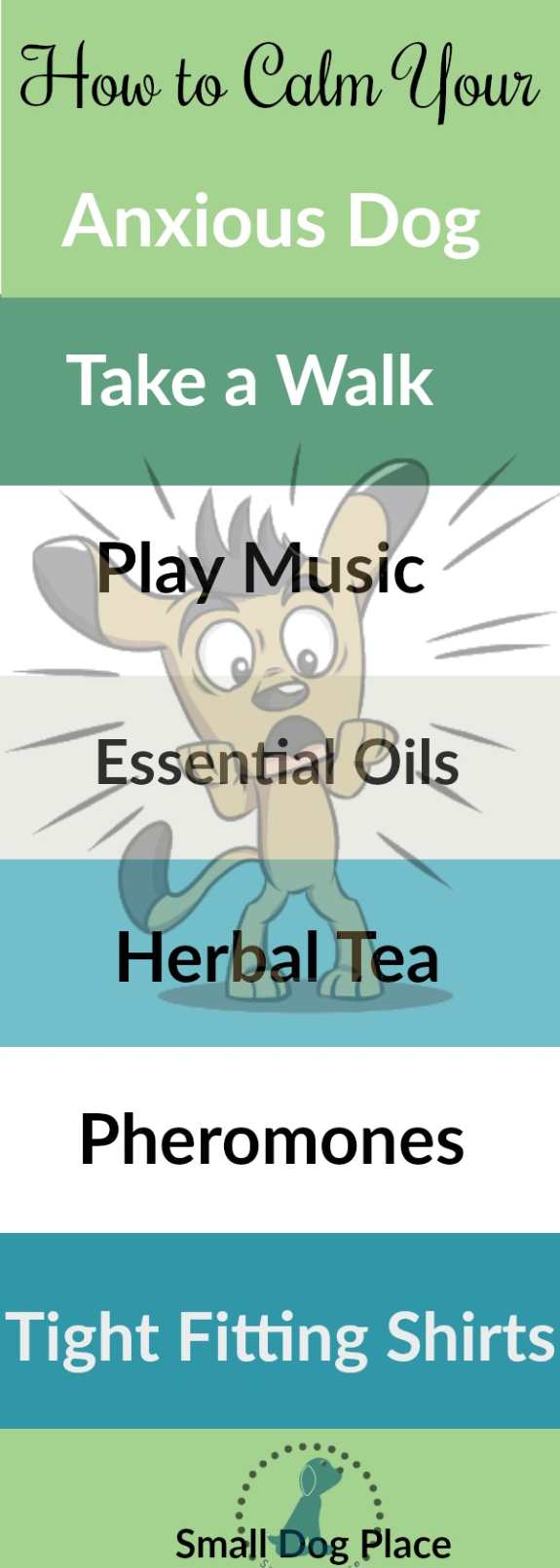Tips and Techniques That Work
By Janice Jones |Last Updated 06-14-2023
Buying a CD or downloading music to help an ANXIOUS dog might seem odd, but it’s not as far fetched as you might think.
We know that humans respond to music and research is now showing that music has a similar effect on dogs.
 How to Help Your Anxious Dog
How to Help Your Anxious DogNot all music is the
same, though and if you are looking for something to calm your anxious, hyper,
or nervous canine, read on.
It would seem that slow, classical music is the best
way to reduce stress and eliminate the need to medicate your anxious dog. And there is research to back up the
claim. In studies done in many
countries, dogs who were in stressful situations such as shelters were noticeably
soothed when exposed to music.
But, music is only one way you can help your anxious dog.
Stressed Dogs
Our favorite small dogs might not ever have to endure the stress associated with shelters, but most must deal with more mundane stress such as thunderstorms, fireworks, relocation, even car trips and household visitors. All of these events that seem commonplace to us put additional stress on our dogs.
I dread thunderstorms. Not because I’m afraid of them or the damage
they can do, but because my little 8 pound Shih Tzu is terrified. It
doesn’t matter if the storm is miles away or right over head, Zoey
starts to shake the minute the clouds roll in. In my neck of the woods, it rains a lot and summers are always prime time for bad storms.
When dogs are frazzled they will react in
predictable ways: barking, whining,
pacing, drooling, spinning, tail chasing, destructive chewing, digging, and the
list goes on and on.
Owners have hunted for remedies for their dog’s anxiety
whether it’s because of separation anxiety or other events such as thunderstorms phobia that cause distress.
Signs of Stress in Dogs
According to Dr Becker, from HealthyPetsMercola.com, there are at least 10 behaviors that dogs exhibit when they are feeling stress.
1. Nose/lip licking
2. Yawning
3. Panting
4. Reduced or absent appetite
5. Diarrhea
6. Tail lowered or tucked
7. Ears pulled or pinned back
8. Cowering/crouched body posture and/or hiding
9. Trembling/shaking
10. Increased vocalizations — whining, howling or barking
These behaviors can show their ugly heads when there is a situation that causes immediate stress such as a thunderstorm, fireworks, visit to the vet or something else that the dog finds stressful, such as the owner leaving for work.
Chronic stress occurs when a dog has been in a situation such as a shelter that puts a dog at risk for physiological problems. Chronic stress is hard on dogs as well as people. It hastens the aging process, contributes to depression and chronic anxiety and even increases the risk of disease by depressing the immune system.
Anxious Dogs are Stressed
Whatever is causing the stress in you dog, the bottom line is that they are going to show some form of anxiety. This is called many things such as separation anxiety, thunderstorm phobia, or compulsive disorders.
How to Relieve Your Dog’s Stress
Walking
Calming music is one way to help an anxious dog relax. There are many others. In one study, Dr. Stanley Cohen reported on research done in Italy on Shelter Dogs that had been living in those conditions for 2 to 3 years. The results showed that a daily walk significantly helped reduce the stress in these dogs. So, simply taking a walk with your anxious dog may help reduce his stress level.
Pheromone Sprays, Candles, Tight Fitting Clothes
Walking is a relatively free cure but if that does not work, there are many forms of medications and treatments on the market that might help. From tight fitting shirts, to pheromone releasing sprays and collars, to treats that contain chamomile, the market has responded to the problem with almost too many choices.
The real problem is that there is not a perfect solution that fits every dog. Some cures work better than others and what works for one dog may not work for another.
TTouch
Developed by Linda Tellington Jones, is a method of message that uses random circular movements over the dog’s body. this type of massage has been used on other types of animals and is intended to change behavior, enhance health performance and well-being. There are many books now written on the subject, but the one I would recommend looking at is Getting in TTouch with Your Dog: A Gentle Approach to Influencing Behavior, Health, and Performance which is written by Linda Tellington Jones.
Aromatherapy and Herbal Remedies
Aromatherapy can be very effective on dogs. A diffuser and some essential oils are the only tools necessary to get started. Your dog’s anxiety level will go down, and so will yours.
Essential oils have been around for millennia and are produced from flowers, roots, stems and leaves. Many herbs have been used and made into teas for calming dogs.
Lavender is likely the best know and can calm as well as be used as a sedative. Make lavender tea and use a small portion to mix in your dog’s food. You can also add lavender essential oil to a diffuser and place where your dog normally stays. You can even apply a couple of drops behind your dog’s ears. If you prefer not to put it directly on the dog, you can add a couple of drops to a cotton ball and place in the room where your dog is likely to be.
Valerian: Calms nerves; helps with noise and separation anxiety. Make a cup of valerian tea and share a bit with your dog. You can also purchase it in capsule or tablet form.
Camomile Tea: Camomile tea can be helpful for calming and to help the dog relax and feel sleepy. You make a cup for yourself and leave about 1/4 cup to be poured over your dog’s food.
Other people have often left the radio or TV on for
their pets when they left claiming that the excess noise keeps the dog calmer
and helps with separation anxiety.
But did you know that music may work just as well to
call that little girl or boy of yours?
Not just any type of music, however, it has to be classical.
I can attest to the fact that music works just as well as any other remedy on the market for Zoey’s distress. (Grooming on my lap during the worst storms also helps!)
The Classical Music Cure
Classical music seems to have the most effect on calming both the canine
members of the household, as well as their human counterparts. Listening to
music reduces agitation, improves the mood and lowers levels of stress.
While
all classical music is superior to heavy metal or pop, certain types seem to
have the best results. Several
interesting findings came from the research on canine calming.
Classical music that had slower tempos such as with 50 to 60 beats per
minute is more calming than a faster piece of music.
Did you know that dogs have the same brain-wave patterns
as humans?
Heart rates vary according to
the size of the dog with larger dogs having slower heart rates. So, by taking the average size dogs, the
tempo of 5 to 60 beats per minute seemed to calm up to 70% of dogs in used in
the research projects.
Not only did the
slow classical music relax the dogs, their heartbeats, blood pressure, brain
waves and respiration rate decreased, as well.
|
|
Solo piano music seems to have a |
|
|
Less complex arrangements worked better on anxious dogs to calm them down. |
|
|
Other research has shown that lower |
This is really good news for the
average pet owner who wants to meet not only the physical but the emotional needs
of their little one. I am no scientist, but I have dogs and when you get a lot
of dogs together, you get barking. I’ve
tried several CDs and am convinced that this stuff is real.
I always loved classical music and play
if for the dogs occasionally even when it is not raining. As you
might expect, the slower, calmer music had an effect on them.
The trouble is that most of the CDS available
have both calming and stimulating music back to back. Then I found the music specifically arranged
for calming dogs. Yes, my 16 dogs still
bark, but the frequency and duration of their barks are much reduced when I
play the music specially arranged for their ears.
As I wrote this article over several
days, I played a variety of different types of music, including some of the CDs
that are mentioned below. It was amazing
how well the dogs seemed to settle and nap.
There was only one problem; can you guess what it was?
I got very relaxed too.
Relaxation:
Not such a bad thing at all!!
For more information on research done, check out the
website,
If you want to give it a try, the following CD/Music
downloads are all available through Amazon.
 |
By Bradley Joseph, this is one in a series of CDs especially done for the canine ear. You can listen to samples of this beautiful piano music at Amazon before you buy. |
More ideas are available in Dr. Kidd’s Guide to Herbal Dog Care
 Ways to Help Your Stressed Dog at Small Dog Place
Ways to Help Your Stressed Dog at Small Dog PlaceFurther Reading
Here are a couple more pages that you might find useful:
Dog Barking Problems
Does This Article Deserve Your Thumbs Up?
We always appreciate your support and encouragement. Your thumbs up means so much to us. Please like this article.
If you find this page or any page on Small Dog Place Helpful, or Useful in anyway, I’d love it if you would click the small heart found on the bottom right of each page.
You can also share or bookmark this page — just click on the:

Free Monthly Newsletter
Sign Up for Our Free Newsletter and get our Free Gift to You.
my E-book, The Top 10 Mistakes People Make When Choosing a Dog (and how to avoid them)










